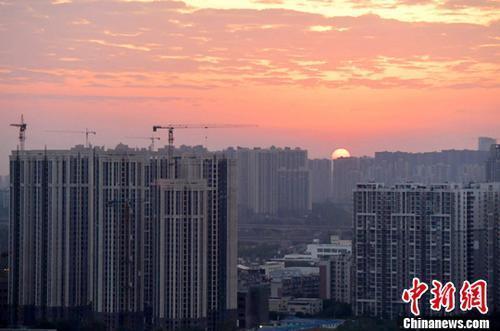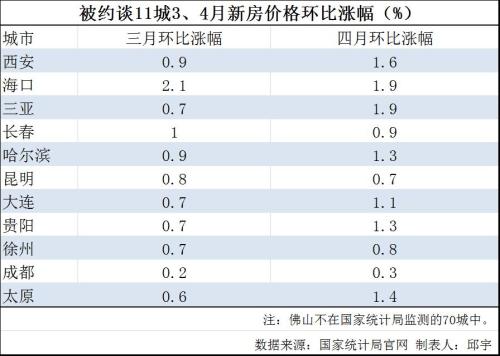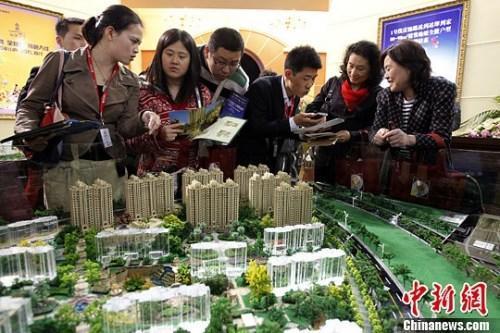Beijing, May 22 (Reporter Qiu Yu) More than half a month ago, the Ministry of Housing and Urban-Rural Development interviewed 12 cities to prevent the real estate market from overheating, and then many new policies were issued, and the local property markets once again ushered in a period of intensive regulation.
The reporter noted that the cities interviewed this time were mainly concentrated in the northeast and central and western regions, and house prices in some cities increased significantly. However, house prices are not the only indicator. Some experts said that this interview was actually related to an early warning mechanism mentioned by the Ministry of Housing and Urban-Rural Development at the end of 2017.
Being interviewed, 7 of the 12 cities have a New Deal.
Recently, the Ministry of Housing and Urban-Rural Development interviewed several city leaders twice on the property market. As of press time, among the 12 cities interviewed, 7 cities have introduced the New Deal, including Hefei, Foshan, Harbin, Changchun, Guiyang, Chengdu and Taiyuan.
The reporter noted that most of these controls are based on the original policies, mainly including the tightening of restrictions on purchases and sales, and the management of pre-sale prices of commercial housing.
Specifically, in terms of purchase restriction:
Chengdu proposed to adjust the object of purchase restriction from natural person to family; Buyers who have moved into the restricted purchase area for less than 24 months can only buy houses if they meet certain conditions; Taiyuan requires that the six districts of the city’s household registration city be limited to two sets.
Restricted sales:
Harbin stipulates that the sale of newly purchased commercial housing in the 6 th district of the main city will be restricted within 3 years; Guiyang stipulates that the purchased new house shall not be transferred within 3 years; Taiyuan requires that newly purchased houses can only be traded and transferred after 2 years; Chengdu proposed that the purchase of new houses or second-hand houses can only be transferred after 3 years.
Pre-sale price management:
Changchun proposed that the actual transaction price of commercial housing should not be higher than the pre-sale declaration price, otherwise it will not be signed online; Guiyang stipulates that the implementation of commercial housing sales clearly marked, one room and one price system; Hefei requires that developers can only pre-sell commercial housing after obtaining the pre-sale permit.
In addition, Foshan stipulates that project opening or sales activities should be avoided at night, and when the number of buyers is expected to be large, sales should be carried out by means of lottery as much as possible.

What are the characteristics of these cities?
— — Feature 1: concentrated in the northeast, central and western regions.
The 12 cities interviewed are Xi ‘an, Haikou, Sanya, Changchun, Harbin, Kunming, Dalian, Guiyang, Xuzhou, Foshan, Chengdu and Taiyuan, which are not all 15 hot cities classified by the National Bureau of Statistics.
"The cities interviewed this time are mainly concentrated in the northeast, the central and western regions, and Hainan, which has introduced a free trade policy, rather than the traditional first-tier and strong second-tier cities." I love my family, Hu Jinghui, president of the Group Market Research Institute, told Zhongxin. com.
In contrast, before Beijing promulgated the "930 New Deal" in 2016, the Ministry of Housing and Urban-Rural Development had interviewed some cities, and then nearly 20 cities issued property market regulation policies. At that time, the former China Banking Regulatory Commission issued a notice to conduct special inspections on banking financial institutions in 16 cities where housing prices rose too fast, and these cities were mainly first-and second-tier.
Yang Donglang, director of the Real Estate Research Institute of Xi ‘an Jiaotong University, pointed out that the absolute value of housing prices in the cities interviewed this time is low. In the case that first-tier and some second-tier cities are strictly restricted, some real estate speculation or investment funds have turned to the original non-hot cities.
— — Feature 2: Many places have introduced the new policy of talent introduction.
"Some cities interviewed have previously introduced talent attraction policies, which are often linked to household registration, and many people can enjoy the preferential purchase of houses by local residents." Hu Jinghui said.
The reporter noted that before being interviewed, cities such as Xi ‘an, Chengdu, Changchun, Guiyang and Xuzhou all issued talent introduction policies, while Hainan issued the Action Plan for Millions of Talents Entering Hainan in mid-May.
— — Feature 3: The price increase in some cities is obvious.
Relaxing the talent settlement policy has brought about an increase in the property market in some places to varying degrees.
According to the housing price data of 70 cities released by the National Bureau of Statistics, among the 12 cities interviewed, except Foshan, the prices of new houses in the other 11 cities rose in March and April without exception.

Among them, in March, the price of new houses in Haikou ranked first in 70 cities, accounting for 2.1%, and Changchun (1%) ranked third. In April, the prices of new houses in seven cities including Xi ‘an, Haikou, Sanya, Harbin, Dalian, Guiyang and Taiyuan all increased by more than 1% month-on-month.
Foshan is not among the 70 cities. According to the data of official website of Foshan Housing and Urban-Rural Development Administration, the average price of new houses in Foshan increased slightly in March, and decreased in April.
What’s the difference between this interview and before?
It is worth noting that not all the 12 cities interviewed are cities with a significant increase in house prices.
"This is related to the early warning system established by the Ministry of Housing and Urban-Rural Development, warning that house prices may rise in some places in the future." Zhang Dawei, chief analyst of Zhongyuan Real Estate, said that this interview was an early warning, which was different from the previous post-event management.
At the end of 2017, the Ministry of Housing and Urban-Rural Development proposed the establishment of "real estate statistics and market monitoring and early warning index system" and "strengthening the evaluation and accountability of local stable real estate market" mechanisms.
Zhang Dawei pointed out that the interviews in 12 cities are actually the landing of the above policies and represent the future warning — — Interview — — Accountability, real estate regulation and control has been upgraded from one city and one policy in the past to three steps.
Hu Jinghui also believes that this interview is related to the monitoring system of the Ministry of Housing and Urban-Rural Development. "If the market has experienced large fluctuations and investment speculation factors have obviously pushed up housing prices, then policies will be introduced, and there will be a lag." He said that it is more timely and effective to adjust policies and accountability according to price changes.

The Ministry of Housing and Urban-Rural Development reiterated twice in 10 days that real estate regulation is not relaxed.
Due to the recent overheating of the real estate market in some cities, speculation has risen. On May 19, the Ministry of Housing and Urban-Rural Development issued the "Notice on Further Improving the Regulation of the Real Estate Market", reiterating that the goal of real estate regulation and control is unshakable and the intensity is not relaxed.
It is worth mentioning that the release of the above-mentioned "Notice" is only 10 days from the Ministry of Housing and Urban-Rural Development’s interview with Chengdu and Taiyuan, emphasizing that the goal of real estate regulation and control will not be shaken and the intensity will not be relaxed.
The "Notice" clearly stated that it is necessary to establish a linkage mechanism between housing prices and land prices to prevent land prices from pushing up housing prices. In this regard, Yan Yuejin, research director of the think tank center of Yiju Research Institute, pointed out that this fully reflects the new ideas of current regulation, contributes to the stability of land prices and is an important part of the long-term development mechanism of real estate.
Yang Donglang believes that the so-called "stable real estate market" refers to the balance between supply and demand and stable prices in the real estate market. If the house price is too high, it can fluctuate slightly, but there should be no skyrocketing or plunging. In order to achieve the stability of the real estate market, in addition to administrative measures such as restricting purchases and sales, it is also necessary to adopt economic and legal means to jointly regulate and control. (End)